Below you will find a list of Forex Brokers that mainly operate in offshore countries. Nowadays, constantly upgrading regulations impose many limitations and restrictions. For instance, due to the ESMA influence, European residents are forced to trade on the Forex market with maximum 1:30 leverage and stop-out levels at 50%. It’s even more complicated in the USA, not only the trading conditions are tight, the number of brokers that accept US clients is very limited. Certainly, going with an offshore Forex broker is more risky, but at the same time, the range of trading possibilities is much wider. In addition, some companies are also regulated by local authorities.

 RoboForex (2009)
Leverage: up to 1:2000
Deposit: from 10 USD
Spreads:
RoboForex (2009)
Leverage: up to 1:2000
Deposit: from 10 USD
Spreads: 


















 FirewoodFX (2014)
Leverage: up to 1:3000
Deposit: from 10 USD
Spreads:
FirewoodFX (2014)
Leverage: up to 1:3000
Deposit: from 10 USD
Spreads: 




 Fibo Group (1998)
Leverage: up to 1:3000
Deposit: from 1 USD
Spreads:
Fibo Group (1998)
Leverage: up to 1:3000
Deposit: from 1 USD
Spreads: 








 TeleTrade (2000)
Leverage: up to 1:500
Deposit: from 10 USD
Spreads:
TeleTrade (2000)
Leverage: up to 1:500
Deposit: from 10 USD
Spreads: 






 4XC (2018)
Leverage: up to 1:500
Deposit: from 10 USD
Spreads:
4XC (2018)
Leverage: up to 1:500
Deposit: from 10 USD
Spreads: 






 FreshForex (2004)
Leverage: up to 1:2000
Deposit: from 10 USD
Spreads:
FreshForex (2004)
Leverage: up to 1:2000
Deposit: from 10 USD
Spreads: 












 Alpari (1998)
Leverage: up to 1:3000
Deposit: from 1 USD
Spreads:
Alpari (1998)
Leverage: up to 1:3000
Deposit: from 1 USD
Spreads: 













 TradeView (2004)
Leverage: up to 1:400
Deposit: from 100 USD
Spreads:
TradeView (2004)
Leverage: up to 1:400
Deposit: from 100 USD
Spreads: 












 Anzo Capital (2015)
Leverage: up to 1:1000
Deposit: from 100 USD
Spreads:
Anzo Capital (2015)
Leverage: up to 1:1000
Deposit: from 100 USD
Spreads: 


 OctaFX (2011)
Leverage: up to 1:1000
Deposit: from 25 USD
Spreads:
OctaFX (2011)
Leverage: up to 1:1000
Deposit: from 25 USD
Spreads: 







 PF Derivatives (1999)
Leverage: up to 1:300
Deposit: from 5 USD
Spreads:
PF Derivatives (1999)
Leverage: up to 1:300
Deposit: from 5 USD
Spreads: 









 FxChoice (2010)
Leverage: up to 1:1000
Deposit: from 10 USD
Spreads:
FxChoice (2010)
Leverage: up to 1:1000
Deposit: from 10 USD
Spreads: 



















 HQ Broker (2017)
Leverage: up to 1:400
Deposit: from 250 USD
Spreads:
HQ Broker (2017)
Leverage: up to 1:400
Deposit: from 250 USD
Spreads: 

 LMFX (2015)
Leverage: up to 1:1000
Deposit: from 50 USD
Spreads:
LMFX (2015)
Leverage: up to 1:1000
Deposit: from 50 USD
Spreads: 






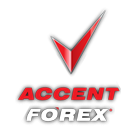 AccentForex (2017)
Leverage: up to 1:500
Deposit: from 50 USD
Spreads:
AccentForex (2017)
Leverage: up to 1:500
Deposit: from 50 USD
Spreads: 





 Grand Capital (2006)
Leverage: up to 1:1000
Deposit: from 10 USD
Spreads:
Grand Capital (2006)
Leverage: up to 1:1000
Deposit: from 10 USD
Spreads: 















 FxGlory (2011)
Leverage: up to 1:3000
Deposit: from 1 USD
Spreads:
FxGlory (2011)
Leverage: up to 1:3000
Deposit: from 1 USD
Spreads: 













 PaxForex (2010)
Leverage: up to 1:500
Deposit: from 10 USD
Spreads:
PaxForex (2010)
Leverage: up to 1:500
Deposit: from 10 USD
Spreads: 










 TradersWay (2011)
Leverage: up to 1:1000
Deposit: from 5 USD
Spreads:
TradersWay (2011)
Leverage: up to 1:1000
Deposit: from 5 USD
Spreads: 










 AAFX (2015)
Leverage: up to 1:2000
Deposit: from 100 USD
Spreads:
AAFX (2015)
Leverage: up to 1:2000
Deposit: from 100 USD
Spreads: 







 LiteFinance (2005)
Leverage: up to 1:1000
Deposit: from 50 USD
Spreads:
LiteFinance (2005)
Leverage: up to 1:1000
Deposit: from 50 USD
Spreads: 











 MTrading (2014)
Leverage: up to 1:1000
Deposit: from 100 USD
Spreads:
MTrading (2014)
Leverage: up to 1:1000
Deposit: from 100 USD
Spreads: 







 SimpleFX (2014)
Leverage: up to 1:500
Deposit: from 1 USD
Spreads:
SimpleFX (2014)
Leverage: up to 1:500
Deposit: from 1 USD
Spreads: 






 Forex.ee (1998)
Leverage: up to 1:500
Deposit: from 50 USD
Spreads:
Forex.ee (1998)
Leverage: up to 1:500
Deposit: from 50 USD
Spreads: 











 Forex4you (2007)
Leverage: up to 1:1000
Deposit: from 1 USD
Spreads:
Forex4you (2007)
Leverage: up to 1:1000
Deposit: from 1 USD
Spreads: 





 NPBFX (1996)
Leverage: up to 1:1000
Deposit: from 10 USD
Spreads:
NPBFX (1996)
Leverage: up to 1:1000
Deposit: from 10 USD
Spreads: 









 NordFX (2008)
Leverage: up to 1:1000
Deposit: from 10 USD
Spreads:
NordFX (2008)
Leverage: up to 1:1000
Deposit: from 10 USD
Spreads: 










 AMarkets (2007)
Leverage: up to 1:3000
Deposit: from 100 USD
Spreads:
AMarkets (2007)
Leverage: up to 1:3000
Deposit: from 100 USD
Spreads: 









 TenkoFX (2012)
Leverage: up to 1:500
Deposit: from 10 USD
Spreads:
TenkoFX (2012)
Leverage: up to 1:500
Deposit: from 10 USD
Spreads: 










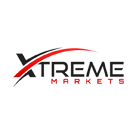 Xtream Markets (2015)
Leverage: up to 1:1000
Deposit: from 5 USD
Spreads:
Xtream Markets (2015)
Leverage: up to 1:1000
Deposit: from 5 USD
Spreads: 










 JustForex (2012)
Leverage: up to 1:3000
Deposit: from 1 USD
Spreads:
JustForex (2012)
Leverage: up to 1:3000
Deposit: from 1 USD
Spreads: 







 BDSwiss (2012)
Leverage: up to 1:2000
Deposit: from 10 USD
Spreads:
BDSwiss (2012)
Leverage: up to 1:2000
Deposit: from 10 USD
Spreads: 











 PrimeXBT (2018)
Leverage: up to 1:1000
Deposit: from 0.0001 BTC
Spreads:
PrimeXBT (2018)
Leverage: up to 1:1000
Deposit: from 0.0001 BTC
Spreads: 






 World Forex (2007)
Leverage: up to 1:1000
Deposit: from 1 USD
Spreads:
World Forex (2007)
Leverage: up to 1:1000
Deposit: from 1 USD
Spreads: 











 FXPrimus (2009)
Leverage: up to 1:1000
Deposit: from 15 USD
Spreads:
FXPrimus (2009)
Leverage: up to 1:1000
Deposit: from 15 USD
Spreads: 








 EagleFX (2019)
Leverage: up to 1:500
Deposit: from 10 USD
Spreads:
EagleFX (2019)
Leverage: up to 1:500
Deposit: from 10 USD
Spreads: 


 BlackBull Markets (2014)
Leverage: up to 1:500
Deposit: from 1 USD
Spreads:
BlackBull Markets (2014)
Leverage: up to 1:500
Deposit: from 1 USD
Spreads: 











 Swiss Markets (2016)
Leverage: up to 1:500
Deposit: from 200 USD
Spreads:
Swiss Markets (2016)
Leverage: up to 1:500
Deposit: from 200 USD
Spreads: 







 Extrasum (2017)
Leverage: up to 1:200
Deposit: from 25 USD
Spreads:
Extrasum (2017)
Leverage: up to 1:200
Deposit: from 25 USD
Spreads: 





 Tifia Markets (2011)
Leverage: up to 1:1000
Deposit: from 10 USD
Spreads:
Tifia Markets (2011)
Leverage: up to 1:1000
Deposit: from 10 USD
Spreads: 






 CryptoAltum (2020)
Leverage: up to 1:500
Deposit: from 0.0001 BTC
Spreads:
CryptoAltum (2020)
Leverage: up to 1:500
Deposit: from 0.0001 BTC
Spreads: 






 Axiory (2012)
Leverage: up to 1:500
Deposit: from 100 USD
Spreads:
Axiory (2012)
Leverage: up to 1:500
Deposit: from 100 USD
Spreads: 






 XBTFX (2019)
Leverage: up to 1:500
Deposit: from 0.0001 BTC
Spreads:
XBTFX (2019)
Leverage: up to 1:500
Deposit: from 0.0001 BTC
Spreads: 










 Yadix (2010)
Leverage: up to 1:500
Deposit: from 100 USD
Spreads:
Yadix (2010)
Leverage: up to 1:500
Deposit: from 100 USD
Spreads: 










 SageFX (2020)
Leverage: up to 1:500
Deposit: from 10 USD
Spreads:
SageFX (2020)
Leverage: up to 1:500
Deposit: from 10 USD
Spreads: 






 Arum Trade (2018)
Leverage: up to 1:200
Deposit: from 1 USD
Spreads:
Arum Trade (2018)
Leverage: up to 1:200
Deposit: from 1 USD
Spreads: 



 LHFX (2020)
Leverage: up to 1:500
Deposit: from 10 USD
Spreads:
LHFX (2020)
Leverage: up to 1:500
Deposit: from 10 USD
Spreads: 


 FxPig (2011)
Leverage: up to 1:500
Deposit: from 200 USD
Spreads:
FxPig (2011)
Leverage: up to 1:500
Deposit: from 200 USD
Spreads: 





 GT IO (2020)
Leverage: up to 1:1000
Deposit: from 5 USD
Spreads:
GT IO (2020)
Leverage: up to 1:1000
Deposit: from 5 USD
Spreads: 







 Doo Prime (2014)
Leverage: up to 1:400
Deposit: from 100 USD
Spreads:
Doo Prime (2014)
Leverage: up to 1:400
Deposit: from 100 USD
Spreads: 







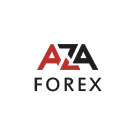 AZAforex (2016)
Leverage: up to 1:1000
Deposit: from 1 USD
Spreads:
AZAforex (2016)
Leverage: up to 1:1000
Deposit: from 1 USD
Spreads: 














 Rockfort Markets (2014)
Leverage: up to 1:100
Deposit: from 500 USD
Spreads:
Rockfort Markets (2014)
Leverage: up to 1:100
Deposit: from 500 USD
Spreads: 



 Juno Markets (2014)
Leverage: up to 1:500
Deposit: from 100 USD
Spreads:
Juno Markets (2014)
Leverage: up to 1:500
Deposit: from 100 USD
Spreads: 








 BKFX (2017)
Leverage: up to 1:500
Deposit: from 5 USD
Spreads:
BKFX (2017)
Leverage: up to 1:500
Deposit: from 5 USD
Spreads: 


 Pacific Union (2015)
Leverage: up to 1:500
Deposit: from 20 USD
Spreads:
Pacific Union (2015)
Leverage: up to 1:500
Deposit: from 20 USD
Spreads: 








 Capitalcore (2019)
Leverage: up to 1:2000
Deposit: from 10 USD
Spreads:
Capitalcore (2019)
Leverage: up to 1:2000
Deposit: from 10 USD
Spreads: 




 AdroFx (2018)
Leverage: up to 1:500
Deposit: from 25 USD
Spreads:
AdroFx (2018)
Leverage: up to 1:500
Deposit: from 25 USD
Spreads: 








 Opoforex (2021)
Leverage: up to 1:1000
Deposit: from 100 USD
Spreads:
Opoforex (2021)
Leverage: up to 1:1000
Deposit: from 100 USD
Spreads: 



 Amega (2017)
Leverage: up to 1:1000
Deposit: from 20 USD
Spreads:
Amega (2017)
Leverage: up to 1:1000
Deposit: from 20 USD
Spreads: 




 InvestAZ (2000)
Leverage: up to 1:100
Deposit: from 1000 USD
Spreads:
InvestAZ (2000)
Leverage: up to 1:100
Deposit: from 1000 USD
Spreads: 

 FxSway (2021)
Leverage: up to 1:500
Deposit: from 10 USD
Spreads:
FxSway (2021)
Leverage: up to 1:500
Deposit: from 10 USD
Spreads: 

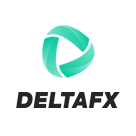 DeltaFX (2009)
Leverage: up to 1:1000
Deposit: from 1 USD
Spreads:
DeltaFX (2009)
Leverage: up to 1:1000
Deposit: from 1 USD
Spreads: 



 Solid ECN (2021)
Leverage: up to 1:1000
Deposit: from 1 USD
Spreads:
Solid ECN (2021)
Leverage: up to 1:1000
Deposit: from 1 USD
Spreads: 






 GANNMarkets (2010)
Leverage: up to 1:400
Deposit: from 100 USD
Spreads:
GANNMarkets (2010)
Leverage: up to 1:400
Deposit: from 100 USD
Spreads: 








 Tradiso (2021)
Leverage: up to 1:100
Deposit: from 100 USD
Spreads:
Tradiso (2021)
Leverage: up to 1:100
Deposit: from 100 USD
Spreads: 






 PU Prime (2015)
Leverage: up to 1:1000
Deposit: from 50 USD
Spreads:
PU Prime (2015)
Leverage: up to 1:1000
Deposit: from 50 USD
Spreads: 




 Investizo (2019)
Leverage: up to 1:1000
Deposit: from 10 USD
Spreads:
Investizo (2019)
Leverage: up to 1:1000
Deposit: from 10 USD
Spreads: 







 SGT Markets (2010)
Leverage: up to 1:400
Deposit: from 1000 USD
Spreads:
SGT Markets (2010)
Leverage: up to 1:400
Deposit: from 1000 USD
Spreads: 




 Baxia Markets (2020)
Leverage: up to 1:2000
Deposit: from 50 USD
Spreads:
Baxia Markets (2020)
Leverage: up to 1:2000
Deposit: from 50 USD
Spreads: 










 Nash Markets (2020)
Leverage: up to 1:500
Deposit: from 10 USD
Spreads:
Nash Markets (2020)
Leverage: up to 1:500
Deposit: from 10 USD
Spreads: 





 CedarFX (2011)
Leverage: up to 1:500
Deposit: from 50 USD
Spreads:
CedarFX (2011)
Leverage: up to 1:500
Deposit: from 50 USD
Spreads: 


 PrimeBit (2019)
Leverage: up to 1:200
Deposit: from 0.0001 BTC
Spreads:
PrimeBit (2019)
Leverage: up to 1:200
Deposit: from 0.0001 BTC
Spreads: 






 Crystal Ball Markets (2020)
Leverage: up to 1:1000
Deposit: from 50 USD
Spreads:
Crystal Ball Markets (2020)
Leverage: up to 1:1000
Deposit: from 50 USD
Spreads: 








 FinPros (2021)
Leverage: up to 1:500
Deposit: from 100 USD
Spreads:
FinPros (2021)
Leverage: up to 1:500
Deposit: from 100 USD
Spreads: 




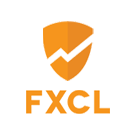 FXCL (2006)
Leverage: up to 1:2000
Deposit: from 10 USD
Spreads:
FXCL (2006)
Leverage: up to 1:2000
Deposit: from 10 USD
Spreads: 




 Blaze Markets (2022)
Leverage: up to 1:200
Deposit: from 100 USD
Spreads:
Blaze Markets (2022)
Leverage: up to 1:200
Deposit: from 100 USD
Spreads: 




 Esperio (2021)
Leverage: up to 1:1000
Deposit: from 10 USD
Spreads:
Esperio (2021)
Leverage: up to 1:1000
Deposit: from 10 USD
Spreads: 




 Fxcess (2020)
Leverage: up to 1:1000
Deposit: from 10 USD
Spreads:
Fxcess (2020)
Leverage: up to 1:1000
Deposit: from 10 USD
Spreads: 

 GMI (2009)
Leverage: up to 1:2000
Deposit: from 15 USD
Spreads:
GMI (2009)
Leverage: up to 1:2000
Deposit: from 15 USD
Spreads: 




 ZForex (2022)
Leverage: up to 1:1000
Deposit: from 10 USD
Spreads:
ZForex (2022)
Leverage: up to 1:1000
Deposit: from 10 USD
Spreads: 







It is somewhat coincidental that the offshore forex brokers featured in our list are literally speaking, off the shore in many island nations. You will therefore find many of them in the Caribbean Island nations of the Pacific, location-wise.
However, the context of this article will look at the forex brokerages that are categorized as “offshore forex brokers” from a regulatory point of view. While offshore brokers are generally recognized as forex brokers that are outside the common regulatory jurisdictions of the US, UK, Australia, Cyprus and other parts of Europe, they actually belong within a classification of forex jurisdictions, which sees regulatory coverage of the forex market divided into five levels (Levels A to E).
We have discussed the countries whose regulators and forex brokerages fall into Levels A, B and C in the section marked “regulated forex brokers”. The regulatory divisions that constitute Levels D and E are where you will find the offshore forex brokers.
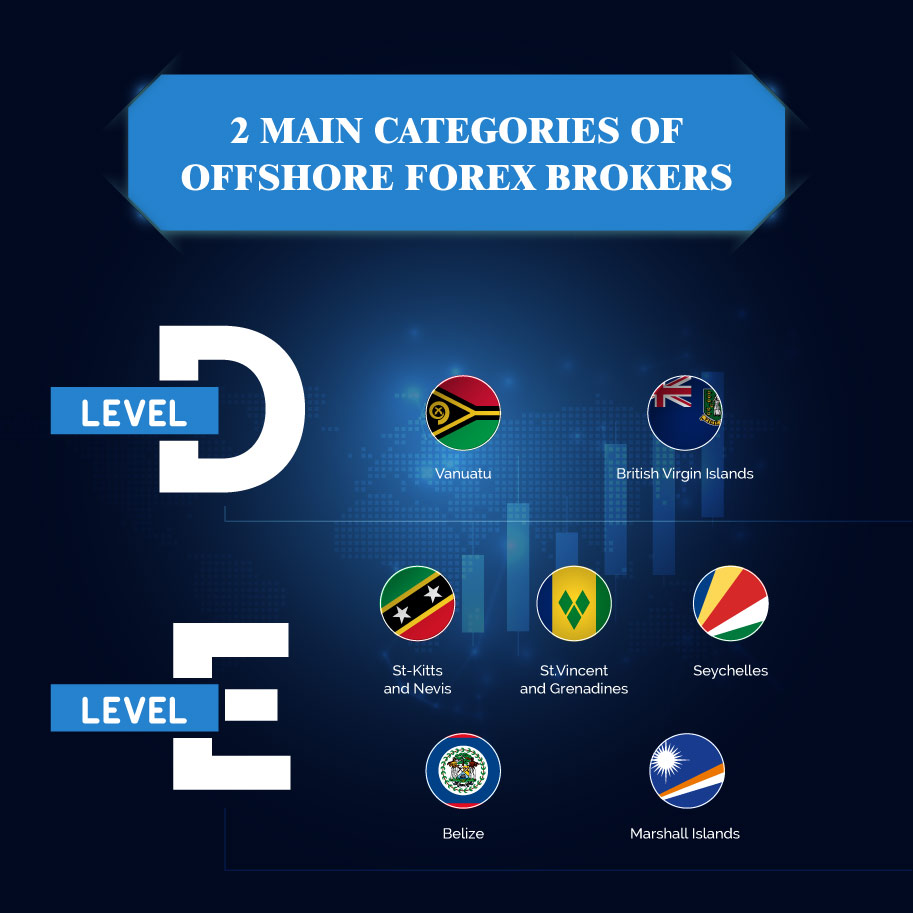
Level D forex jurisdictions have a regulatory structure in place for the offshore forex brokers that operate in these areas. This regulatory structure is quite permissive and for this reason, the general regulatory community worldwide regards these jurisdictions as being the most lax regulatory environments in the world. Lax or not, offshore forex brokers in the Level D jurisdictions will need to have a license to operate, as well as a bank account to be able to receive and pay out funds to their clients. Vanuatu and the British Virgin Islands are the two countries that make up the Level D forex areas, with Vanuatu being the more popular location.
Typically, cost of license acquisition, incorporation and bank account opening for offshore brokers in Vanuatu are quite low, when compared with similar requirements for Levels A, B and C jurisdictions. Taxes are also low or absent in these areas. Furthermore, the process of obtaining a license as a forex brokerage is a lot faster. The relatively low barrier for entry into the forex brokerage business in these locations is what makes them very attractive to investors who want to open forex brokerages but lack the hefty bankroll that would have been required if the processes were to be done elsewhere. The entire costs incurred in the licensing process, including the capital requirements, are usually less than $200,000.
The forex market regulators in Vanuatu and the BVI are the Vanuatu Financial Services Commission (VFSC) and the BVI Financial Services Commission (BVI FSC) respectively. A look at our list will show that the following offshore forex brokerages operate either in Vanuatu or the British Virgin Islands: Circle Markets, LeoPrime, Accent Forex, Forex4you, NordFX, N1CM.
Jurisdictions categorized as Level E are St-Kitts and Nevis, St.Vincent and Grenadines, Seychelles, Belize and Marshall Islands. Some also add the Eastern European countries of Estonia and Latvia to the mix. Forex licensing is not required, which brings the cost of setting up an offshore brokerage in these locations down to very low levels. Indeed, with only a few thousand dollars, a forex brokerage can be setup and it takes only a week to complete the process. However, there is a downside. Most banks will not offer offshore forex brokerages in these locations access to banking services without a forex license. This not only restricts the funding options for traders in terms of access to card and bank payment methods, but it also poses a problem in terms of security of the trader’s funds and businesses, since there is no regulator to report to.
Some offshore forex brokerages have opted to adopt cryptocurrencies as a preferred method of depositing and withdrawing from their accounts. This completely bypasses the fiat payment systems, and puts the offshore forex brokerage out to the trading public more as an exchange than as a forex brokerage.
Despite the unregulated nature of Level 5 jurisdictions, offshore forex brokers in these areas are still seeing good patronage from across the world. Their cause has been helped by the imposition of leverage caps on forex trading in the EU, UK and of course the US. The trader demographics of the forex market shows that many unsophisticated investors still trade with as low hundreds of dollars in total capital. With many of these traders now unable to afford the steep margin requirements in the UK, EU and US, they have simply migrated to many offshore brokers operating in Level D and Level E jurisdictions, where they will typically get very low account opening requirements ($1 in some cases), and access to high leverage which enables their few trading dollars go a long way.
It must also be mentioned that the advent of cryptocurrencies has helped the cause of offshore forex brokers. Not only have these exotic assets excited the retail trading segment of the market to the point where regulation of exchanges that offer cryptos is no longer seen as a barrier for entry, but the existence of several unregulated but very strong and robust exchanges like Binance and Huobi seem to have spoken a message to retail traders: regulation of a brokerage may not really matter if the expectations of traders are being met. Let’s face it. Binance and several other crypto exchanges which are still standing and delivering value to their clients are unregulated, yet customers have never complained of being shortchanged or not receiving their profits when they are withdrawn. This seems to have given many retail traders confidence to place their money with offshore forex brokers who are generally regarded as being weak on regulation. Some of the brokers showcased on our list have also gone ahead to show by their business conduct that they can be relied on to deliver transparency and a sound trading experience, whether they are regulated or not.
The list on this page features several offshore forex brokers that are located across the Level D and Level E jurisdictions. One factor that they all have in common is that they tend to offer to their clients, what they cannot get elsewhere. For instance, the high leverages that they provide are virtually non-existent in the EU and UK. So if you are excited by some of these offerings and can take the risk of doing business with brokers that are softer on regulation, feel free to make a selection from the list above.